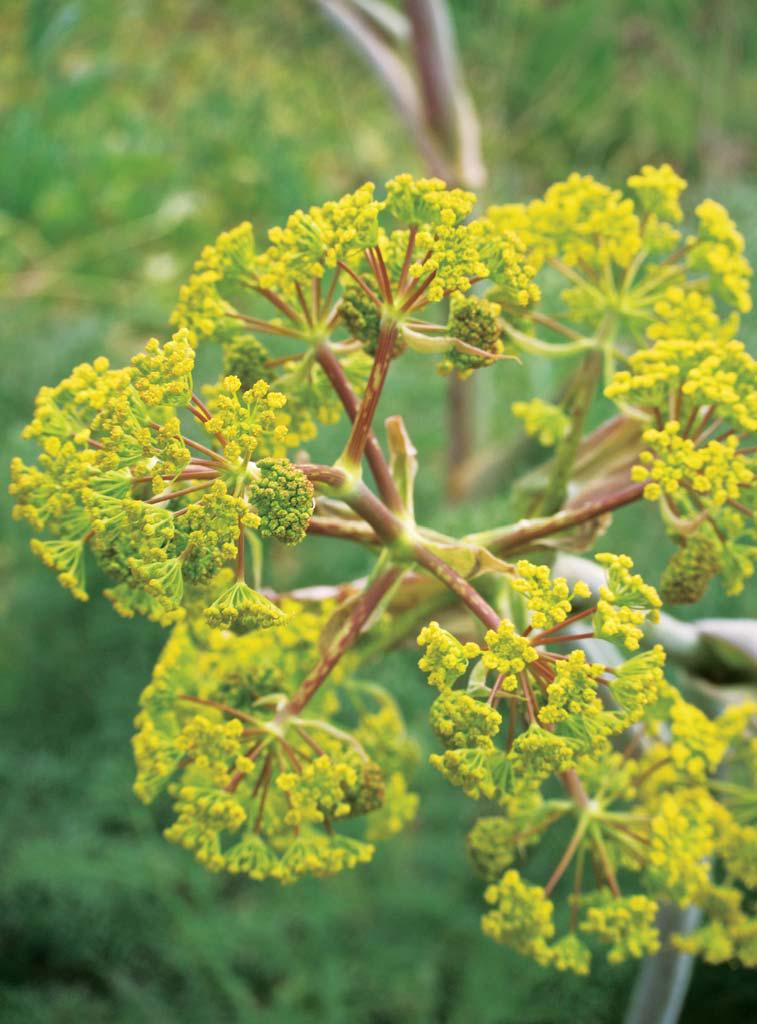ANCIENT SILPHIUM (POSSIBLY)

NATIONAL PUBLIC RADIO recently reported that the Vatican has opened a public exhibition called "Life and Death in the Rome of the Caesars" that features a Vatican Necropolis, a Roman burial ground located a few feet beneath St. Peter's Basilica in Rome. The necropolis heretofore was opened only to academics and other specialists. It contains marble sarcophagi, tombs dating back to the first century, Roman frescoes and beautiful mosaics.
Enslaved people, artisans and middle-class Roman citizens-many who were employed by the infamous emporer Nero-are buried there, according to epigraphs at the site. Nero became Caesar at the age of 16 in 54 CE and reigned until 68 CE, when he committed suicide. (The Senate had turned against him.) Remembered as a cruel and eccentric tyrant, Nero was nonetheless reported to have been the recipient of a very special gift during his life-the last existing stalk of the herb silphium.
Silphium's ancient home turf was a narrow strip of North Africa, 125 miles long and just 35 miles wide, bordering the Mediterranean Sea along the coast of modern Libya and Tunisia, in Nero's day known as Cyrene.
Silphium, or silphion in Greek, was so valuable and the pressure to harvest it so strong that after that last gift to Nero, it was by all accounts extinct. First of all, goats and sheep loved it; what humans didn't harvest, the animals did. For inhabitants of the Roman Empire, it was worth its weight in silver. So much so that Julius Caesar, the first Roman emperor from 49 to 44 BCE, kept a thousand pounds of silphium along with gold in the imperial treasury.
Theophrastus (371 to 287 BCE), the Greek Father of Botany, described the plant as having thick roots covered in black bark with a hollow stalk, similar to fennel, and golden leaves like celery. Its flowers were balls of florets with a rich golden hue.
Denne historien er fra March - April 2024-utgaven av Horticulture.
Start din 7-dagers gratis prøveperiode på Magzter GOLD for å få tilgang til tusenvis av utvalgte premiumhistorier og 9500+ magasiner og aviser.
Allerede abonnent ? Logg på
Denne historien er fra March - April 2024-utgaven av Horticulture.
Start din 7-dagers gratis prøveperiode på Magzter GOLD for å få tilgang til tusenvis av utvalgte premiumhistorier og 9500+ magasiner og aviser.
Allerede abonnent? Logg på

GARDEN GOAL: MORE SPRING BULBS
Take these five steps now to ensure a better bulb display next spring
SAY HELLO TO HELICONIAS
Tired of the same ol' cannas or dahlias in your summer garden scheme? It's time to get acquainted with heliconias

PENSTEMONS ARE PERFECTION
THIS NORTH AMERICAN GENUS OFFERS INTRIGUING FLOWERS ON DROUGHT-TOLERANT PLANTS

A LIVELY LANDSCAPE
Historic garden cemeteries, such as Rhode Island's Swan Point, can delight a visiting plant lover

REALLY GOOD ROSES
The latest cultivars to prove themselves in nationwide trials

BOBBY WARD A scholar of plants and plantspeople
BOBBY WARD IS ONE of the most respected names in the world of horticulture.

BUDBURST
Gardeners can help scientists understand plants' responses to climate change

TANGLING WITH VINES
I'M GUESSING that vines, pound for pound, produce the highest ratio of leaf surface per support structure of any terrestrial plant.

HEADING NORTH
AS WINTERS TREND WARMER, NORTHERN GARDENERS CAN TURN TO THESE PROMISING SOUTHERN NATIVES

Unbridled COLOR Combos
PAIR A BRIGHT-LEAVED MAIN CHARACTER WITH EQUALLY BOLD COMPANIONS FOR LASTING DRAMA IN THE GARDEN
